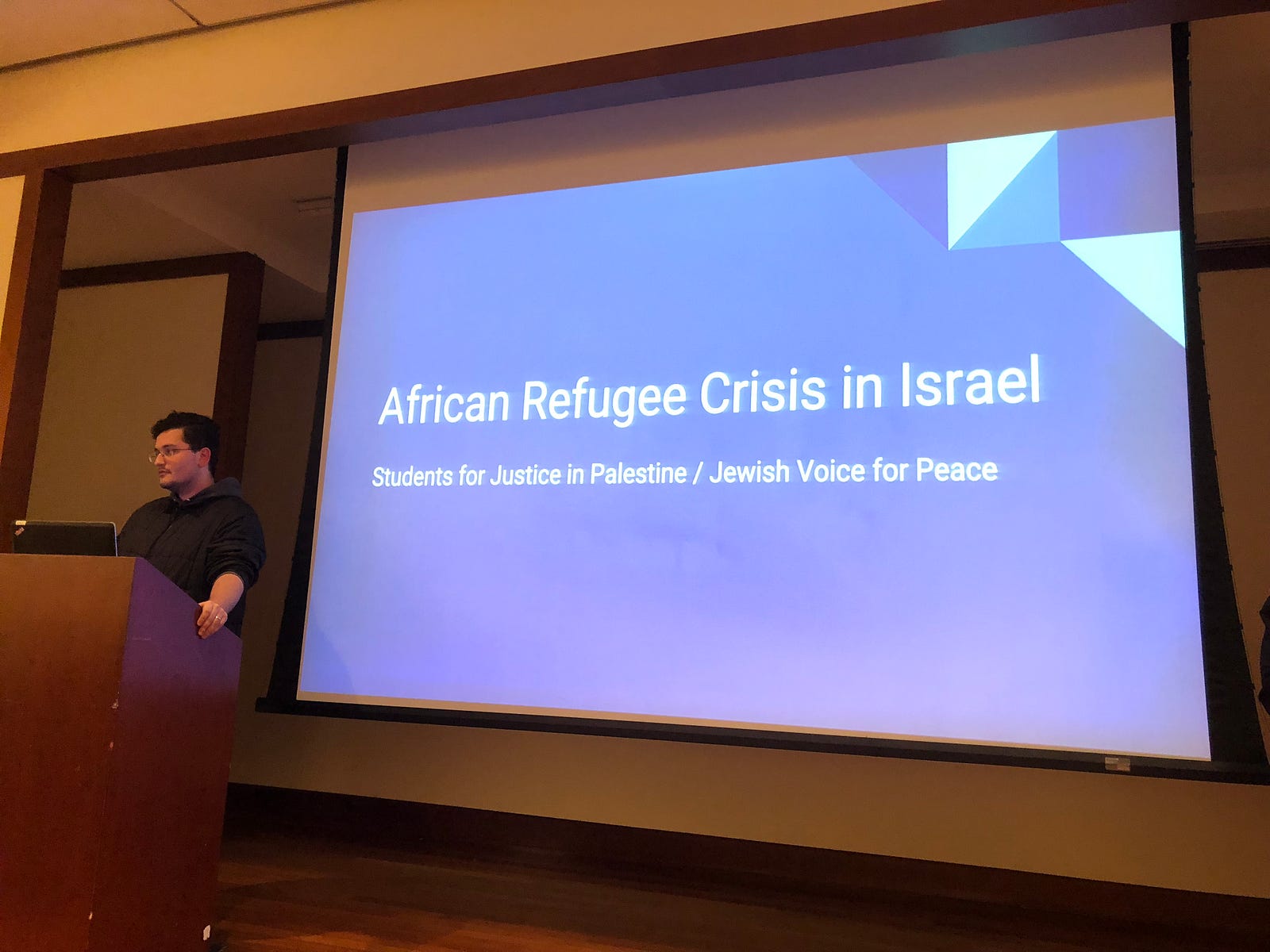The event began with Khalid Abudawas, president of SJP, along with Muna Abdelwahab, a representative of
Mosaic: The Interfaith Students of Color Coalition at NYU (which cosponsored the event), giving an informational presentation on the situation in Israel.
In January, the Israeli government controversially gave
notice to those they labeled “infiltrators” — people who did not enter the country in a government approved manner — to either leave voluntarily or be imprisoned indefinitely. Of the 38,000 who fall into that category, only single men who had their asylum status rejected or didn’t submit one in the first place will be
deported; women, children, families and those who submitted asylum statues requests prior to 2018 will be exempt. Most of the African migrants in Israel fled conflict and oppression in Sudan and Eritrea, traveling via the Sinai Peninsula.
The presentation provided a brief history of the issue, including the difficulties the African migrants have once they reach Israel, facing racism and trouble finding work, and the
Holot detention center where many asylum seekers are being held.
“Israel simply does not, at least to a certain extent, want Black Jews in its country,” Abudawas said. “A significant portion of these immigrants are Jewish or have converted to Judaism themselves.”
“It’s not just due to a space problem or anything, it’s more of a race problem,” Abdelwahab added. “It’s just plain out wrong.”
Afterwards, the discussion was opened up to the 30-strong audience, and things got heated quickly as Abudawas presided over the fiery dialogue. At times, attendees became angry and emotional as they attempted to talk over each other. Abudawas remained relatively calm throughout, answering questions and attempting to let people finish their comments. A JVP member who asked not to be identified by name said they recognized many of those in attendance as belonging to NYU’s
Realize Israel chapter, a pro-Israel group.
One audience member questioned why the African migrants went to Israel instead of Jordan or Lebanon. She also wondered why more didn’t officially apply as asylum seekers. “Regardless of whether or not it’s granted to you … it’s a start,” she said.
Abudawas pointed out that the asylum seeking process can be a difficult and expensive one and takes many years. Abdelwahab also mentioned that only
11 individuals — less than a percent of applicants—had in fact been successfully granted refugee status. Abdelwahab also explained that countries such as Lebanon and Jordan are already
grappling with the influx of refugees fleeing the Syrian crisis, and that it was easier to reach Israel by land. “These people are going as a last resort,” she said.
“I just don’t even understand … I don’t understand how there can be any disagreement on the fact that refugees don’t want to be displaced,” said one audience member during the debate. “Human rights are human rights.”
Some participants defended Israel, arguing that the policy and the “infiltrators” label did not reflect all Israelis and that the country should not be labelled racist. “Calling them ‘infiltrators’ … that does not mean that Israel as a county views them as people … who are coming at all to cause problems,” said one person. “[Israeli Prime Minister Benjamin] Netanyahu does not represent the opinion of a lot of Israelis,” said another.
Others expressed disbelief that, having been establisheds for Jewish refugees, Israel rejects asylum seekers today. Abudawas paralleled the situation with the
Muslim ban in the United States.
Many members of the audience took issue with the rejection of Israel and its asylum policy being called racist, with some saying there was a difference between systemic and interpersonal forms of racism that others in attendance did not grasp, and that they were oversimplifying the process of asylum seeking. Voices were raised and comments interrupted, though Abudawas largely managed to preside over the debate. At one point a woman said, “I think it’s getting really rude,” to which a man on the other side of the room retorted, “On both sides.”
After the formal meeting came to an end, many formed a circle of chairs to continue the conversation informally.
“I look forward to building new avenues for constructive and respectful dialogue,” attendee Adela Cojab said of the “delicate” subject.
The organizers also reflected on the meeting to Local.
“It was a meeting that was really important to be had, however the dialogue wasn’t too great,” a visibly angry Abdelwahab said after the event. “I would’ve hoped for a little better, a little more informed dialogue. People should at least know what they’re talking about before saying anything. But it was also important to be had, this specific talk with the people who are here.”
Abudawas, for his part, was not surprised by the way the conversation turned out. “I think it was less productive and more indicative of campus politics in that there’s a strong shift between those who align with Israel and those who align with Palestine,” he said. “I got what I expected.”
